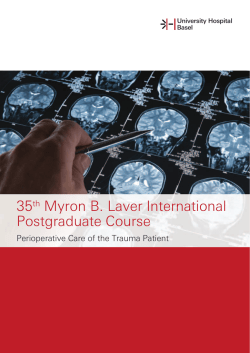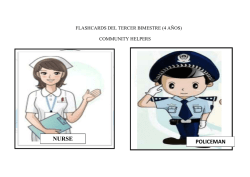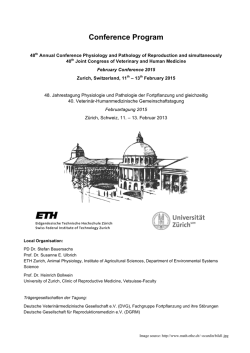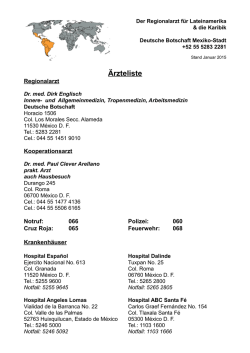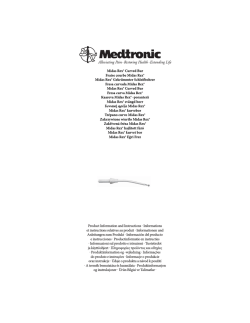
MBL 2015-Program v141003
University Hospital Basel 35th Myron B. Laver International Postgraduate Course Perioperative Care of the Trauma Patient Weichen richtig stellen Entgleisungen in der Intensivmedizin vermeiden Wo Leben in Gefahr ist, sind überdurchschnittliche Leistungen gefragt. CSL Behring stellt sich dieser Herausforderung seit mehr als 100 Jahren: mit der Entwicklung hochwertiger Medikamente, mit engagiertem Wissenstransfer und innovativem, flächendeckendem Service. Bei Notfallpatienten kommt es auf jede Minute an. Oft sterben sie an zu hohem Blutverlust. Weil Gerinnungsstörungen und Mangel an Gerinnungsfaktoren ein wichtiger Indikator sind, ist ein perioperatives Gerinnungsmanagement in der Notfalltherapie unerlässlich. Dazu gehören ein engmaschiges Monitoring des Gerinnungs status und hochwertige Medikamente, wie sie CSL Behring liefert. Dear Participant Over the last two decades, the appearance of trauma patients in Switzerland, and presumably in all of Western Europe, has changed. Traffic safety regulations, modern car technology, speed limitations and general overcrowding of our roads and motorways have altered the feature of major trauma; incidences have declined; patterns and mechanisms are different; and one advantage of the early days – trauma patients being young, male, and previously healthy individuals – has diminished. At the same time, our perspectives on multiple trauma, treatment options, and surgical strategies look different. New insights into prehospital stabilzation, early management of shock and volume resuscitation, prevention of co-agulation disorders, diagnosis and radiologic imaging, damage-controlled or non-invasive surgery along with trauma anesthesia and perioperative intensive care have modified our conceptual framework for major trauma patients. This postgraduate course will address some of these aspects of modern trauma treatment. We will first cover the epidemiology and basic physiological context of trauma, address important aspects of preoperative survey, damage control radiology, intra- and postoperative treatment, and finish with specific trauma and intensive care topics including rehabilitation. Switzerland is a «safe» country and major trauma has become a rare event. Political stakeholders have allocated the care of victims of major trauma to designated centers, but even these do not achieve a high caseload, and, not quite unexpected for a strong federalist country, the decision is not wellaccepted everywhere. Effective care of the seriously-injured patient requires the skills of clinicians of several medical specialties and appropriate organizational conditions. Provision of quality of care is not automatically guaranteed by declaring a hospital as a trauma center, and the declining numbers of major trauma patients make routine high-standard procedures an ongoing challenge. Wolfgang Ummenhofer Session I: Pathophysiology and Preclinical Care Moderator: L. A. Steiner Friday, January 30, 2015 (Morning Session) 08.15 – 09.00 Registration in the ZLF lobby 09.00 – 09.15 Welcome/Introduction 09.15 – 09.45 Be Aware of Sunday Afternoons in Summer! Trauma Epidemiology from a Registry R. Lefering Cologne, Germany 09.45 – 10.15 Role of the Swiss Trauma System P.-M. Sutter Biel, Switzerland 10.15 – 10.45 Fluid Resuscitation in Trauma D. Chappell Munich, Germany 10.45 – 11.15 Coffee Break 11.15 – 11.45 Traumatic Brain Injury in SwitzerlandDoes Prehospital Care Matter? M. Zuercher Basel, Switzerland 11.45 – 12.15 Imaging and Interventional Radiology in Trauma Management C. J. Zech Basel, Switzerland 12.15 – 13.00 Discussion with all speakers Session II: Intraoperative Management Moderator: W. Ummenhofer Friday, January 30, 2015 (Afternoon Session) 14.15 – 14.45 Damage Control Resuscitation during Uncontrolled Hemorrhage R. P. Dutton Hamilton, Canada 14.45 – 15.15 Modern Damage Control Surgery for TraumaHigh Tech or Old Fashioned? S. K. D‘Amours Sydney, Australia 15.15 – 15.45 Coagulation Management in TraumaHow Should We Proceed? O. M. Theusinger Zurich, Switzerland 15.45 – 16.15 Coffee break 16.15 – 16.45 The Anesthesiologist‘s Role in Pediatric Trauma Care S. R. Sharar Seattle, WA, USA 16.45 – 17.15 Craniectomy in Traumatic Brain Injury P. J. Hutchinson Cambridge, UK 17.15 – 17.45 Discussion with all speakers 17.45 – 18.30 Guest lecture 18.30 Close of scientific session 18.30 Alumni dinner (for those who have reserved) B. Moore Zurich, Switzerland Session III: Intensive Care and Rehabilitation Moderator: H. Pargger Saturday, January 31, 2015 08.15 – 09.00 Coffee and croissants 09.00 – 09.30 Multi-stage Approach M. Jakob Basel, Switzerland 09.30 – 10.00 Abdominal Compartment SyndromeWhen to Open... How to Close S. K. D‘Amours Sydney, Australia 10.00 – 10.30 Hope and Hype in Human Spinal Cord Injury? A. Curt Zurich, Switzerland 10.30 – 11.00 Rehabilitation of Patients with Critical IllnessPolyneuropathy M. Hund-Georgiadis Basel, Switzerland 11.00 – 11.30 Discussion with all speakers 11.30 Close of scientific session Faculty (in alphabetical order) Daniel Chappell, MD, PhD, Associate Professor, Department of Anesthesiology, University Hospital of Munich, Germany Armin Curt, MD, FRCPC, Professor of Spinal Cord Injury Research, University of Zurich; Director of the Spinal Cord Injury Center, University Hospital Balgrist, Zurich, Switzerland Scott K. D’Amours, MDCM, FRCS(C), FRACS, Senior Lecturer in Surgery, The University of New South Wales; Director, Trauma Department, Liverpool Hospital, Sydney, NSW, Australia Richard P. Dutton, MD, MBA, Professor, Executive Director, Anesthesia Quality Institute, Park Ridge, IL, USA Margret Hund-Georgiadis, MD, Associate Professor, Chief Physician and Medical Director, REHAB Basel, Centre for Paraplegia and Craniocerebral Injury Trauma Patients, Basel, Switzerland Peter J. Hutchinson, BSc (hons), MBBS, PhD, FRCS (Surg Neurol), Professor of Neurosurgery, Senior Academy Fellow and Honorary Consultant Neurosurgeon; Professor and Head of Department of Neurosurgery and Academy of Medical Sciences / Health Foundation Senior Surgical Scientist Fellowship within the Department of Clinical Neurosciences, University of Cambridge; Honorary Consultant and Neurosurgeon, Addenbrooke’s Hospital; John van Geest Centre for Brain Repair, School of Clinical Medicine, Addenbrooke’s Hospital, Cambridge, UK Marcel Jakob, MD, Professor, “Chief of Staff”, Surgical Head of the Emergency Department, Head of Traumatology and Lower Extremities, Department of Surgery, University Hospital Basel, Switzerland Rolf Lefering, MD, Professor, Institut für Forschung in der Operativen Medizin (IFOM), Lehrstuhl für Chirurgische Forschung, Private Universität Witten/Herdecke GmbH, Cologne, Germany Ben Moore, PhD, Professor of Astrophysics, Director, Centre for Theoretical Astrophysics & Cosmology, Institute for Computational Science, University of Zurich, Switzerland Hans Pargger, MD, Associate Professor and Head of Surgical Intensive Care, Department for Anesthesia, Surgical Intensive Care, Prehospital Emergency Medicine and Pain Therapy, University Hospital Basel, Switzerland Sam R. Sharar, MD, Professor, Department of Anesthesiology & Pain Medicine, University of Washington, Seattle, WA, USA Luzius A. Steiner, MD, PhD , Professor and Chairman, Department for Anesthesia, Surgical Intensive Care, Prehospital Emergency Medicine and Pain Therapy, University Hospital Basel, Switzerland Paul-Martin Sutter, MD, National Program Director, ATLS Switzerland; Medical Head of Traumatology, Spitalzentrum Biel, Switzerland Oliver M. Theusinger, MD, Private Lecturer at the University of Zurich; Chief Emergency Physician for Protection and Rescue Zurich (EMS); Senior Physician, Institute for Anesthesiology, University Hospital and University of Zurich, Switzerland Wolfgang Ummenhofer, MD, Associate Professor, Head of Prehospital Emergency Medicine, Department for Anesthesia, Surgical Intensive Care, Prehospital Emergency Medicine and Pain Therapy, University Hospital Basel, Switzerland Christoph J. Zech, MD, Associate Professor, Division Head, Interventional Radiology, University Hospital Basel, Switzerland Mathias Zuercher, MD, Associate Professor, Head of Rescue and Disaster Medicine, Department for Anesthesia, Surgical Intensive Care, Prehospital Emergency Medicine and Pain Therapy, University Hospital Basel, Switzerland General Course Information Hosted by: Address for Correspondence: Department for Anesthesia, Surgical Intensive Care, Prehospital Emergency Medicine and Pain Therapy University Hospital Basel Basel, Switzerland 35th MBL International Postgraduate Course Department for Anesthesia, Surgical Intensive Care, Prehospital Emergency Medicine and Pain Therapy University Hospital Basel CH 4031 Basel, Switzerland Phone: +41 61 265 72 58 Fax: +41 61 265 73 20 E-mail:[email protected] Website:http://www.anaesthesia.ch/mbl Language: English (no simultaneous translation will be available) On-line Registration: http://www.anaesthesia.ch/mbl (online registration is preferred) On-site Registration and Information: Registration begins on Friday, January 30, 2015 at 8:15 am in the foyer of the „Zentrum für Lehre und Forschung“ (ZLF), Hebelstrasse 20. The registration and information desk will be open during the entire proceedings. Information Registration Fee: The cost of the course is CHF 400. Please register by January 17, 2015 so that we can give an approximate number to the caterers. Payment should be made in Swiss francs by using the enclosed payment slip or via e-banking to Credit Suisse, CH-8070 Zurich, Switzerland, in favour of “Verein zur Foerderung von Wissenschaft und Ausbildung am Departement Anaesthesie der Universitaet Basel” (IBAN: CH12 0483 5060 1315 8100 0, SWIFT/BIC: CRESCHZZ40A). Note: Credit cards cannot be accepted for the registration fee. Lunch Ticket: Lunch tickets for Friday are available for CHF 30. If you wish to attend, this cost should be included with your registration fee. Buffet Dinner: A buffet dinner will be served in the Holsteinerhof (Hebelstrasse 30) of the University Hospital Basel for faculty and participants immediately after the last session on Friday. The cost of CHF 50 should be included with your registration fee if you plan to attend. Limited space is available. General Course Information Swiss Credit Points: SSAR/SGAR: 9.5 points SGI: 10 points SGNOR: To be announced Hotel Reservations: Basel Tourismus Tel: +41 (0) 61 268 6868 or http://www.baseltourismus.ch Venue: Small Auditorium University Hospital Basel Congress Center Zentrum für Lehre und Forschung (ZLF) Hebelstrasse 20 CH 4031 Basel, Switzerland Phone +41 (0) 61 265 7254 Travel by Train: Arriving at Basel SBB: Take Bus 30; get off at the stop “Bernoullianum”. Head down the hill, taking a right onto Hebelstrasse. The venue will be labeled. Travel by Car: Arriving via expressway to Basel City, then follow road sign labeled „Universitätsspital“. Limited parking is available in City Parking on Klingelbergstrasse 20 / Schanzenstrasse 48 with a pedestrian entry / exit at Hebelstrasse 20. Travel by Air: Arriving at EuroAirport Basel-Mulhouse-Freiburg: Take Bus 50 to the stop “Bahnhof SBB”; change to Bus 30; get off at the stop “Bernoullianum”. Head down the hill, taking a right onto Hebelstrasse. The venue will be labeled. Allison Dwileski Department for Anesthesia, Surgical Intensive Care, Prehospital Emergency Medicine and Pain Therapy University Hospital Basel CH- 4031 Basel, Switzerland Phone +41 61 265 72 58 Fax: +41 61 265 73 20 E-mail: [email protected] www.usb.ch The 35th Myron B. Laver International Postgraduate Course is sponsered in part by:
© Copyright 2026
